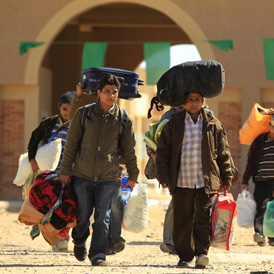A million children in ‘very real danger’ in western Libya
Save the Children aid worker Tom Godfrey tells Channel 4 News the charity fears for the children in western Libya who it cannot reach.

Looking at the crowds of people in the transit camps that have sprung up on Tunisia’s border with Libya, two things stand out. The first is that they are overwhelmingly men; the second is that there are very few Libyans.
The reason for the gender imbalance is clear: most of those crossing the border are economic migrants, who tend to be single men sending money back to their countries. But no-one knows why so few Libyans are crossing the border. It is a mystery, and one that needs to be solved.
For now the camps are largely calm. People can see the movement of other migrants to airports and ports for repatriation, and that’s giving them some reassurance that they’ll be going home soon too.
Women and children have been crossing in small numbers, and we’re pleased to see they’ve been well-treated by the Tunisian authorities. Most families spend less than half a day at the camp, which is great news from our point of view.
But if large numbers of Libyans were to cross the border here, the situation could quickly change. The camps would no longer be transit hubs, filled with people en route to their home countries. Instead they would be refugee camps in the true sense: full of people driven from their homes with nowhere else to go.
The reports we’re getting from western Libya are certainly very worrying. We’re hearing that Libyan troops are controlling who leaves the country, and when. There are stories of a build-up of people on the Libyan side of the border. If Libyans are being prevented from leaving dangerous areas, then that has really serious implications – Save the Children estimates that a million children could be at risk in the west of the country.
If the Libyans aren’t coming to us, it is essential that we get to them. More than a hundred thousand people have crossed this border in the past two weeks. It is safe to assume they felt a fairly compelling reason to leave, and reports of heavy fighting in western towns in recent days are doing little to alleviate our fears.
In short, humanitarian agencies like Save the Children need access to the west of Libya, and we need it soon. While we’re waiting to get it, we’ll do what we can here in Tunisia to help those families who have crossed the border. We’re planning to distribute hygiene kits so people can keep clean while they wait to go home. We’re also lining up stocks to make sure we’re ready in case the situation deteriorates and more people end up in camps.
While this work is important, we know it‘s not enough. As an aid worker, there is nothing more frustrating than not being able to get to those who need our help. In western Libya, there are a million children in very real danger, and whatever happens in the coming weeks, we’ll be doing everything we can to reach them.
Tom Godfrey is working for Save the Children on the Tunisia’s border with Libya. To donate to our work on the Libyan crisis call 0800 8148 148 or visit http://www.savethechildren.org.uk/libya-appeal